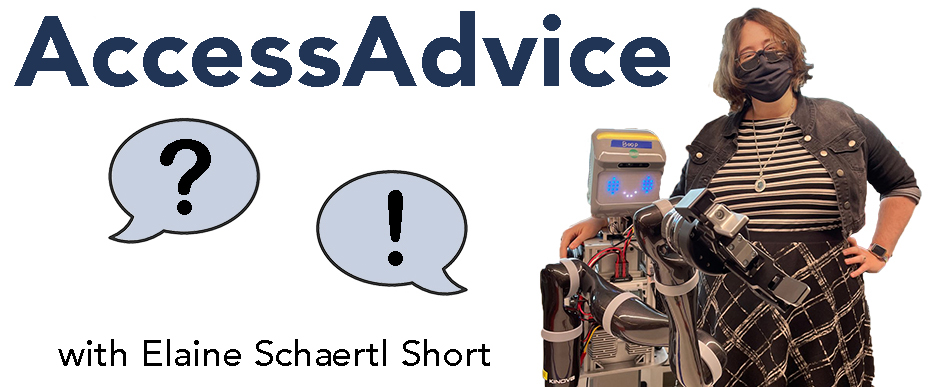AccessAdvice: Disability Identity

I have some medical diagnoses that are often considered disabilities. However, they are mostly invisible, and I have a lot of compensating strategies that help keep them that way—to the point where well-meaning acquaintances and even once a medical professional have said things like “oh, you can’t have ADHD, you got good grades in high school.” The strategies that let me “pass” have costs in time and energy, but most of the time the results are good enough to get by.
I find the discussions of some disability community groups valuable—I’ve gotten lots of really great strategies from strangers on the internet—but I am never sure whether I should claim to be “disabled,” given that I am mostly not perceived that way. Being part of a community of people who share similar challenges is valuable to me, and I love the idea of being able to share back into the community my own strategies in case they will help others. On the other hand, I don’t want to somehow take away from the experience of people who are more affected by their conditions—and I’m afraid of being judged by people as a hypochondriac or attention-seeking for claiming that my conditions qualify as a disability. And, beyond the interactions with others, accepting that my conditions are (at least sometimes) life-affectingly disabling can be a hard thing to hear in my own mind and come to terms with.
So, how do you know if you’re ready to/willing to/deserve to claim a disability identity?
Thanks, Disability Imposter Syndrome
Dear Disability Imposter Syndrome,
I initially started answering this question with a little review of disability history, the legal definitions of disability, and some of the possibilities that are opened by thinking about disability from a social model perspective. But partway through writing I realized what I really want to tell you is what my disability identity means to me. On the one hand, I could tell you that I am unambiguously, visibly, medically-certifiedly Disabled with a capital “D”: I need to use a wheelchair, one of the most frequently-used symbols for disability; I have a parking placard; I’ve had to read the Fair Housing Act and the Americans with Disabilities Act; I can tell you which local sidewalks are passable (not many) and which local businesses have ramps (almost none). All of those things certainly affect my disability experience, both for better (diagnosis is a privilege) and worse (my disability discloses itself whether I like it or not), but they have little to do with my disability identity.
If I have to commit to a definition, I would say for me being disabled means living with a non-normative body or mind, in tension with my surroundings and other people’s default assumptions and expectations. It also means being part of the disability community, which at its best disrupts those normative expectations and makes space for many more ways of existing in the world: We remember people’s dietary restrictions and look for ramps. We hang back for the slow walkers and wait for the slow talkers. We remember that not everyone even walks or talks at all. We volunteer to teach the conference organizers about accessibility, and then volunteer to do it again when it didn’t stick the first time. We give each other grace and space when our bodies and minds demand a break and cover for each other when we can. We work to come up with creative solutions to conflicting needs rather than immediately giving up. We resist any of us being made into symbols of tragedy or inspiration, or dehumanized problems to be solved by medicine or engineering. We do our best to meet each other’s access needs, and when we fail, we try to do better the next time.
At the end of the day, I can’t decide for you if you’re ready or willing to claim a disability identity. Disability is both a stigmatized identity and implies a level of permanence that I think can be difficult for a lot of people who are on the fence in the way you describe being. That said, I hope I can give you permission to take it a little easier on yourself. Most importantly, a disability identity doesn’t have to be constant or eternal: you could identify yourself as disabled at certain times and in certain spaces and not in others, or you could identify as disabled now but not in a year (or vice versa). It’s also okay to for your identity to take more than one word to describe; you could say “I have a disability, but enough coping mechanisms that it doesn’t affect me much day-to-day” or you could say “I have an occasionally-disabling condition, but I don’t really identify as disabled” or you could say “I don’t think of myself as disabled but I have a lot in common with the _____ community” or you could say “I consider myself disabled under the social model of disability but not under the medical model”. I hope you'll also let go of the idea that you have to be "disabled enough" to "deserve" a disability identity. That kind of thinking isn't uncommon, but it's influenced by the legal and medical frameworks where there are thresholds that have to be met in order to qualify for treatment or accommodation. Most disability-centered spaces (including AccessComputing!) take a much more relaxed approach: as long as you have a non-normative body or mind that affects the way you move through the world, you belong, and there's no burden of proof other than self-identifying as disabled.
If after all that, you decide that identifying as disabled feels right to you, welcome to the club! And in either case, I hope you'll embody some of those disability community values all the same; accessibility benefits more than just those of us with disabilities, and I would be pleased to see it become more the norm across all of society.